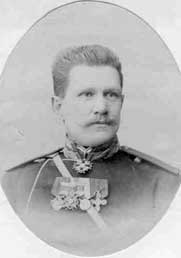Eduard Karl von Freymann
Eduard Karl Gustav von Freymann adH Nursie ( Russian : Эдуард Рудольфович фон Фрейман, * 1. December 1855 in Kiev , † 25. December 1920 in Moscow ) was a from the Baltic originating nobleman and lieutenant general in the Imperial Russian Army- .
Life
Eduard Karl was accepted into the tsarist page corps in 1868 . He was first to the chamber bellman appointed and on 10 August 1868 ensign in the Life Guards - Regiment transported. He was a participant in the Turkish War of 1877/78 and was injured in the battle of Gorni-Dubnik near Telisch in the left knee. In 1878 he was promoted to second lieutenant and in 1879 at the special disposal of Prince Alexander Mikhailovich Dondukow-Korsakov , where he served as an officer in the commandant administration of the Russian occupation army in Bulgaria . He then became company commander of the 4th company in the 1st Sofia- Druskina of the Bulgarian troops. On December 14, 1879, he was promoted to captain in the Bulgarian service. During the Bulgarian National Assembly he took over the function of a sub-commissioner of the Kremikorschen (Kremikowzi) municipality , he was entrusted with the supervision of the elections . On August 1, 1881 he was at the direction of the Bulgarian prince I. Alexander to military school shifted to the post of "du-jour officer" (duty officer). He taught military and war administration until 1882 and gave lectures in geography . Then he took over command of Druskina No. 10, which was stationed near Pleven . Then he returned to the 4th Company of Sofia-Druskina and in 1884 he was promoted to lieutenant in the Imperial Russian Army. Later he took over the regimental economy of the Sofia Infantry Regiment. Eduard Karl was ordered to Russia in 1885 when war threatened between Bulgaria and Turkey . Still with the rank of lieutenant, he returned to the bodyguard hunter regiment, where he commanded the 6th company from 1886 to 1898. In 1887 he was promoted to staff captain , in 1892 to captain and in 1898 to colonel . In 1896 he and his association were sent to Moscow for the coronation ceremonies of the tsar . In 1899 he became battalion commander and in 1903 commander of the 148th Caspian Infantry Regiment. He took part in the Russo-Japanese War 1904/05 and was injured for the second time. In 1906 he was given command of the 100th Ostrowsche Infantry Regiment. With the promotion to major general he became commander of the 2nd Brigade of the 23rd Infantry Division in Reval . His last command from 1914 was the 67th Infantry Division. With simultaneous promotion to lieutenant general , the privilege of wearing uniform and full pension payment, he was dismissed from service.
He spent his old age in Oranienbaum near Saint Petersburg and died on December 25, 1920 in Moscow.
Awards
- Order of St. Vladimir (3rd class)
- Russian Order of Saint Anne (2nd, 3rd and 4th grade)
- Russian Order of Saint Stanislaus (1st, 2nd and 3rd class)
- Legion of Honor
- Bulgarian Order of St. Alexander
Origin and family
Eduard Ernst came from the Baltic noble family von Freymann , his father was the Russian major general Rudolph Karl Ernst von Freymann (1821–1906). He married his cousin Elisabeth Natalie von Freymann (* 1863 in Warsaw ; † 1931), daughter of Otto Woldemar von Freymann (1821–1871). The marriage remained without offspring.
Web links
Individual evidence
- ↑ The Chamber Page. In: Adelung - Grammatical-Critical Dictionary of High German Dialect, MDZ- Bayerische Staatsbibliothek [1] , accessed December 13, 2017
- ↑ Druskina = Bulgarian independent battalion with four companies bg: Шестнадесети пехотен ловчански полк
- ↑ Du jour, officer. In: General Real Encyclopedia of the Entire Art of War: a reference library for officers of all weapons, in alphabetical order; Edition 2, Verlag AW Hayn, 1827, original from Harvard University , digitized December 2, 2005 [2] page 229, accessed December 13, 2017
| personal data | |
|---|---|
| SURNAME | Freymann, Eduard Karl von |
| ALTERNATIVE NAMES | Freymann adH Nursie, Eduard Karl Gustav von (full name) |
| BRIEF DESCRIPTION | Russian lieutenant general |
| DATE OF BIRTH | December 1, 1855 |
| PLACE OF BIRTH | Kiev |
| DATE OF DEATH | December 25, 1920 |
| Place of death | Moscow |
